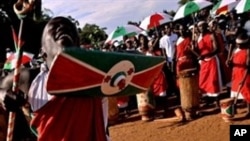The central African country of Burundi is scheduled to hold a series of elections. With just days left before the first ballot is cast, there is growing concern that escalating political violence will derail Burundi's attempts to achieve peace after years of civil war.
Residents in Bujumbura say the city remains tense three days after angry demonstrators, protesting the death of an opposition activist, fought a street battle with riot police in the capital.
Two unidentified men gunned down the opposition activist last week as he headed home from a campaign rally for the Movement for Solidarity and Democracy, one of the half dozen parties poised to challenge the ruling National Council for the Defense of Democracy-Forces for the Defense of Democracy Party in elections this year. Protesters say the murder was politically motivated.
It is the latest in a string of political violence incidents that have rocked the country since last September. Most have been clashes between ruling party loyalists and members of the National Liberation Forces, the ruling party's closest competitor. But members of smaller parties have been wounded in attacks blamed on supporters of the ruling party and the main opposition party.
The violence precedes a series of polls in Burundi that are scheduled to begin Friday. District elections are first, followed by a presidential vote on June 28, legislative elections on July 23 and 28 and village-level elections on September 7.
The New York-based Human Rights Watch group warned last week that political violence was jeopardizing Burundi's efforts to achieve stability after years of conflict.
A Human Rights Watch researcher in Burundi, Neela Ghoshal, tells VOA that, although the country suffered through 16 years of ethnic-related violence between the Hutus and the Tutsis, the struggle now is between Hutu groups vying for political power.
"The two parties, who are the primary contenders in these elections, are both former rebel groups, who once fought on the same side, who then turned their guns against each other, and who are now contesting democratic elections," said Ghoshal.
In 2005, Burundians elected former rebel leader Pierre Nkurunziza as president in a poll that was generally judged to be free and fair.
President Nkurunziza, who is running for a second term, has vowed to punish those responsible for threatening the peace in upcoming elections. The leader of the opposition National Liberation Forces, Agathon Rwasa, has also condemned political violence in recent speeches.
But Ghoshal says no one has been held accountable.
"Positive and constructive comments need to be followed up by action. And that is where the police and the prosecutors come in," said Ghoshal. "They need to be investigating. They need to be identifying individuals who are responsible so that responsibility is transferred from parties to individuals because that is the only way they can put a stop to the cycle of revenge and violence."
Human Rights Watch says, with former combatants among supporters of both parties, some still heavily armed, there is a potential for serious escalation of violence, if large numbers lose faith in the justice system and begin taking the law into their own hands.




